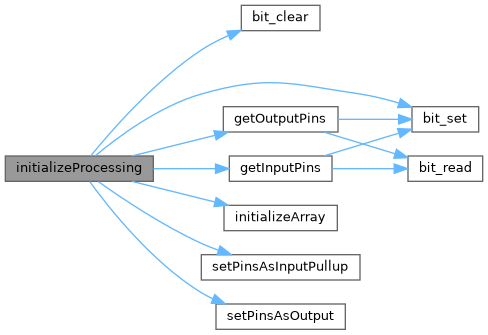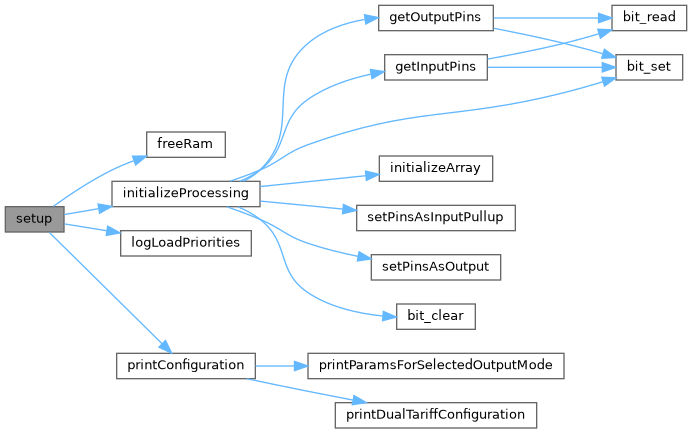Functions and classes responsible for system setup and configuration. More...
Functions | |
| constexpr uint16_t | getInputPins () |
| Retrieves the input pins configuration. | |
| constexpr uint16_t | getOutputPins () |
| Retrieves the output pins configuration. | |
| template<size_t N> | |
| constexpr void | initializeArray (int32_t(&array)[N], int32_t value) |
| Initializes all elements of a given array to a specified value. | |
| void | initializeProcessing () |
| Initializes the processing engine, including ports, load states, and ADC setup. | |
| void | printConfiguration () |
| Print the configuration during startup. | |
| void | setup () |
| Called once during startup. | |
Detailed Description
Functions and classes responsible for system setup and configuration.
This group includes functions and classes that handle the initialization of hardware components, system parameters, and other configurations required for the proper operation of the system.
- Ensures that all components are properly configured before the system starts.
- Includes setup routines for relays, pins, ADCs, and other peripherals.
- Provides default configurations and validations to ensure system stability.
Function Documentation
◆ getInputPins()
|
constexpr |
Retrieves the input pins configuration.
This function determines which pins are configured as input pins based on the current hardware setup. It ensures that no pin is configured multiple times and handles special cases like the dual tariff, diversion, rotation, and force pins.
- Returns
- A 16-bit value representing the configured input pins. Returns 0 if an invalid configuration is detected.
- Note
- This function is marked as
constexprand can be evaluated at compile time.
Definition at line 185 of file processing.cpp.


◆ getOutputPins()
|
constexpr |
Retrieves the output pins configuration.
This function determines which pins are configured as output pins based on the current hardware setup. It ensures that no pin is configured multiple times and handles special cases like the watchdog pin.
- Returns
- A 16-bit value representing the configured output pins. Returns 0 if an invalid configuration is detected.
- Note
- This function is marked as
constexprand can be evaluated at compile time.
Definition at line 134 of file processing.cpp.


◆ initializeArray()
|
constexpr |
Initializes all elements of a given array to a specified value.
This function is a compile-time constant expression (constexpr) that allows initializing arrays of any size with a specific value. It is particularly useful in embedded systems where predictable initialization is required.
- Template Parameters
-
N The size of the array (deduced automatically).
- Parameters
-
array A reference to the array to be initialized. value The value to assign to each element of the array.
- Note
- The function can be evaluated at compile time if all inputs are known at compile time.
Definition at line 112 of file processing.cpp.

◆ initializeProcessing()
| void initializeProcessing | ( | ) |
Initializes the processing engine, including ports, load states, and ADC setup.
This function performs the following tasks:
- Initializes the DC offset array for voltage samples.
- Configures the input and output pins based on the hardware setup.
- Sets up the ADC in free-running mode with interrupts enabled.
- Prepares the system for processing energy and load states.
- Note
- This function must be called during system initialization to ensure proper operation.
Definition at line 242 of file processing.cpp.


◆ printConfiguration()
|
inline |
Print the configuration during startup.
This function outputs the system configuration to the Serial output during startup. It includes details about the sketch, build information, electrical settings, and enabled features.
- Prints the sketch ID, branch name, commit hash, and build date/time.
- Outputs electrical settings such as power calibration, voltage calibration, and phase calibration.
- Displays enabled features like temperature sensing, dual tariff, load rotation, relay diversion, and RF communication.
- Logs the selected datalogging format (Human-readable, IoT, or JSON).
Definition at line 47 of file utils.h.


◆ setup()
| void setup | ( | ) |
Called once during startup.
This function initializes the system, configures pins, and prints system configuration to the Serial Monitor. It also initializes optional features like temperature sensing and load priorities.
- Delays startup to allow time to open the Serial Monitor.
- Initializes the Serial interface and debug port.
- Displays configuration information.
- Initializes all loads to OFF at startup.
- Logs load priorities and initializes temperature sensors if present.
- Prints available free RAM for debugging purposes.
Definition at line 334 of file main.cpp.

Generated by